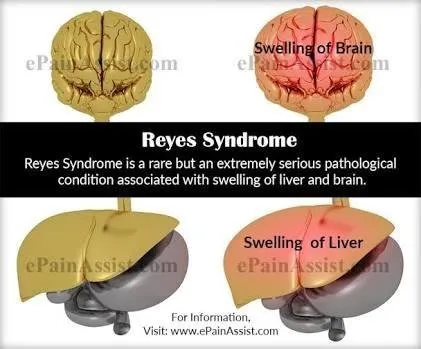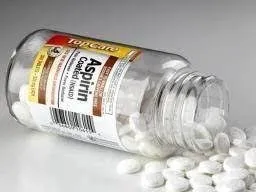Reye syndrome is a rapidly progressive encephalopathy.
The term 'encephalopathy' is a broad one used to describe any brain disease that alter brain structure and function.
Symptoms of the syndrome may include vomiting, personality changes, confusion, seizures, and loss of consciousness. Death occurs in 20–40% of those affected and about a third of those who survive are left with a significant degree of brain damage.

Source: www.ePainAssist.com
HISTORY OF THE SYNDROME
The syndrome is named after Dr. Douglas Reye, who, along with fellow physicians Drs. Graeme Morgan and Jim Baral, published the first study of the syndrome in 1963 in The Lancet. In retrospect, the occurrence of the syndrome may have first been reported in 1929.
Also in 1964, Dr. George Johnson and colleagues published an investigation of an outbreak of influenza B that described 16 children who developed neurological problems, four of whom had a profile remarkably similar to Reye syndrome. Some investigators refer to this disorder as Reye-Johnson syndrome, although it is more commonly called Reye syndrome.
In 1979, Dr. Karen Starko and colleagues conducted a case-control study in Phoenix, Arizona and found the first statistically-significant link between aspirin use and Reye syndrome. Studies in Ohio and Michigan soon confirmed her findings, pointing to the use of aspirin during an upper respiratory tract or chickenpox infection as a possible trigger of the syndrome.
Beginning in 1980, the CDC cautioned physicians and parents about the association between Reye syndrome and the use of salicylates in children and teenagers with chickenpox or virus-like illnesses. In 1982 the U.S. Surgeon General issued an advisory, and in 1986 the Food and Drug Administration required a Reye syndrome-related warning label for all aspirin-containing drug.
OCCURRENCE
Reye syndrome occurs almost exclusively in children. While a few adult cases have been reported over the years, these cases do not typically show permanent neural or liver damage.
Unlike in the UK, the surveillance for Reye syndrome in the US is focused on patients under 18 years of age.
CAUSES

Source: Public domain
There is an association between taking aspirin for viral illnesses and the development of Reye syndrome, but no animal model of Reye syndrome has been developed in which aspirin causes the condition.
The serious symptoms of Reye syndrome appear to result from damage to cellular mitochondria, at least in the liver, and there are a number of ways that aspirin could cause or exacerbate mitochondrial damage. A potential increased risk of developing Reye syndrome is one of the main reasons that aspirin has not been recommended for use in children and teenagers, the age group for which the risk of lasting serious effects is highest.
No research has found a definitive cause of Reye syndrome, and association with aspirin has been shown through epidemiological studies. The diagnosis of "Reye Syndrome" greatly decreased in the 1980s, when genetic testing for inborn errors of metabolism was becoming available in developed countries. A retrospective study of 49 survivors of cases diagnosed as "Reye's Syndrome" showed that the majority of the surviving patients had various metabolic disorders, particularly a fatty-acid oxidation disorder medium-chain acyl-CoA dehydrogenase deficiency.
In some countries, oral mouthcare product Bonjela (not the form specifically designed for teething) has labeling cautioning against its use in children, given its salicylate content. There have been no cases of Reye syndrome following its use, and the measure is a precaution. Other medications containing salicylates are often similarly labeled as a precaution.
The Centers for Disease Control and Prevention (CDC), the U.S. Surgeon General, the American Academy of Pediatrics (AAP) and the Food and Drug Administration (FDA) recommend that aspirin and combination products containing aspirin not be given to children under 19 years of age during episodes of fever-causing illnesses. Hence, in the United States, it is advised that the opinion of a doctor or pharmacist should be obtained before anyone under 19 years of age is given any medication containing aspirin (also known on some medicine labels as acetylsalicylate, salicylate, acetylsalicylic acid, ASA, or salicylic acid).
SIGNS AND SYMPTOMS
Reye syndrome progresses through five stages;

Stage I
- Rash on palms of hands and feet.
- Persistent, heavy vomiting that is not relieved by not eating.
- Generalized lethargy
- Confusion
- Nightmares
- Headaches
Stage II
- Stupor
- Hyperventilation
- Fatty liver (found by biopsy)
- Hyperactive reflexes
Stage III
- Possible coma
- Possible cerebral edema
Stage IV
- Deepening coma
- Dilated pupils with minimal response to light
- Minimal but still present liver dysfunction
Stage V
- Seizures
- Multiple organ failure
- Flaccidity
PROGNOSIS
Documented cases of Reye syndrome in adults are rare. The recovery of adults with the syndrome is generally complete, with liver and brain function returning to normal within two weeks of onset. In children, however, mild to severe permanent brain damage is possible, especially in infants. Over thirty percent of the cases reported in the United States from 1981 through 1997 resulted in fatality.
In Nigeria, there are fewer than 500 cases recorded yearly, and 20-40% leads to death.
TREATMENT
There's no specific treatment for Reye's syndrome beyond supportive care and aggressive monitoring for complications.
** Supportive care:
Monitoring in the intensive care unit, Mechanical ventilation, Intracranial pressure monitoring, and IV fluids.
** Medications:
Diuretic and Vitamin
**Specialists:
Critical Care Doctor, Paediatric Critical Care Doctor, Gastroenterologist, Paediatrician, Paediatric Gastroenterologist, and Medical Geneticist.
AUTHOR OPINION

It is a common phenomenon for people to self prescribe drugs, after all it's just paracetamol or aspirin. This is not supposed to be; a major reason why drugs manufacturing companies prefer to indicate dosage "as directed by your physician."
Whether it's your wife or kid that falls ill, it is highly recommended that whichever prescription we use, must be under the supervision of a healthcare professional. Why because, should there be adverse reaction, he/she would know what to recommend to control such.
For our children, the system is still in the growth phase, and as such, intolerance and long term repercussion of self prescription is common.
Let's stop putting ourselves at risk, and always remember to keep all drugs out of the reach of children.
Be your own safety guard. Cheers!!
REFERENCES
https://en.m.wikipedia.org/wiki/Reye_syndrome#cite_ref-Pug2008_2-6
https://doi.org/10.1016%2FS0140-6736%2863%2990554-3
https://www.ncbi.nlm.nih.gov/pubmed/7454476
https://www.ncbi.nlm.nih.gov/pubmed/7079050
https://www.ncbi.nlm.nih.gov/pubmed/2680560
https://web.archive.org/web/20090426205906/http://www.mhra.gov.uk/NewsCentre/Pressreleases/CON044014